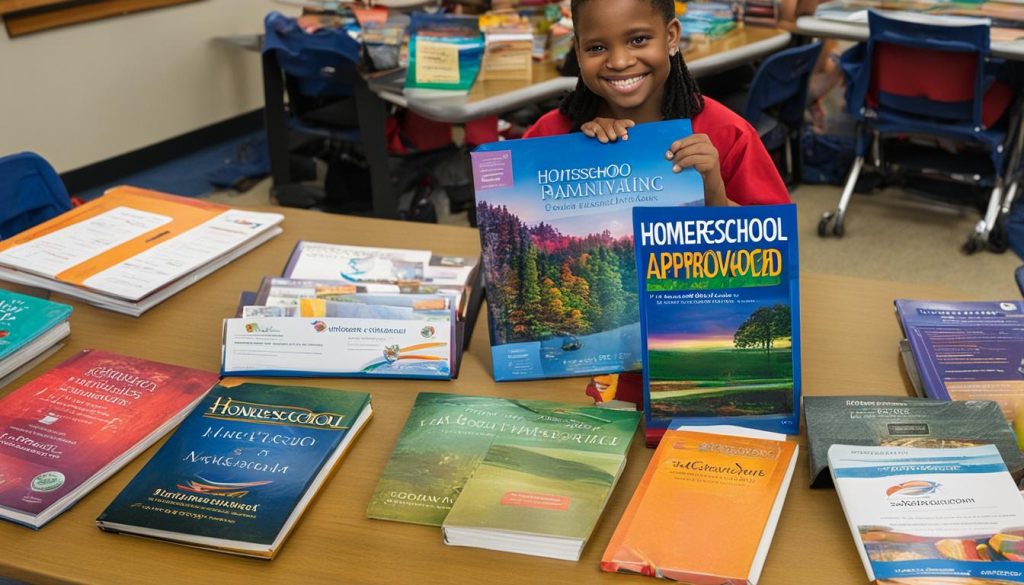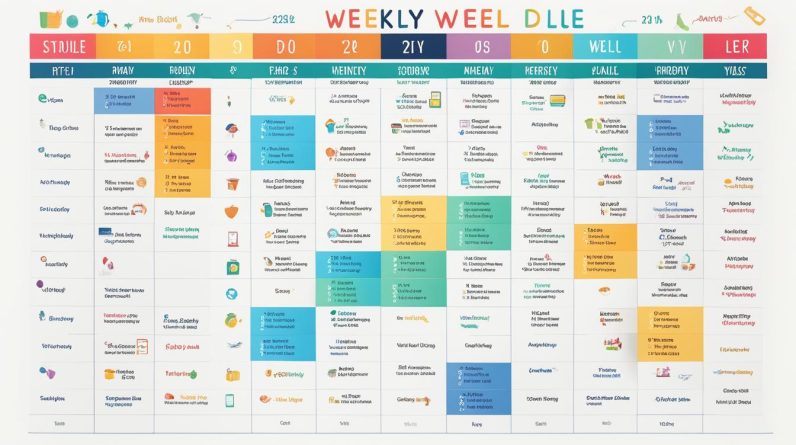Are you a parent interested in providing a quality education for your child through home schooling? With the option to educate your child at home in New Jersey, it’s important to understand the requirements and responsibilities of homeschooling. While you don’t need to be a certified teacher, you may consider earning a home schooling certificate to enhance your skills and knowledge as an educator.
By earning a home schooling certificate, you can gain valuable training and resources that will support your parent-led education journey. Whether you’re looking for an accredited home schooling certificate, a homeschool diploma for parents, or a parent certification program, there are options available to help you succeed in your home-based education.
Key Takeaways:
- Home schooling in New Jersey allows parents the freedom to educate their child at home.
- You don’t need to be a certified teacher to homeschool your child in New Jersey.
- Earning a home schooling certificate can provide valuable training and resources.
- There are options available such as homeschool diplomas and parent certification programs.
- A home schooling certificate can validate your commitment to providing a quality education for your child.
Understanding the Homeschooling Laws in New Jersey
In New Jersey, parents have the option to provide equivalent instruction to their children at home, as allowed under the compulsory education law (N.J.S.A. 18A:38-25). The law requires parents to ensure that their child receives instruction equivalent to that provided in public schools. Failure to comply with this law may result in fines. However, there have been court decisions that clarify the procedures and requirements for homeschooling in New Jersey.
“equivalent instruction elsewhere than at school.”
This provision allows parents to educate their child at home, provided they offer instruction that is equivalent to what is offered in public schools. The New Jersey homeschooling laws grant parents the freedom to choose their curriculum and determine the best way to educate their children.
Significant Court Decisions
Two court decisions have played a vital role in shaping homeschooling laws in New Jersey:
- State v. Vaughn (1965): This landmark case emphasized that homeschooling is a legitimate educational alternative protected by the Fourteenth Amendment of the United States Constitution. The court ruled that as long as parents provide instruction equivalent to that offered in public schools, homeschooling is a legally valid choice.
- State v. Massa (1967): This case further clarified the legal obligations of homeschooling parents. The court ruled that homeschooling parents must demonstrate that they are providing instruction that is academically equivalent to that provided in public schools.
These court decisions affirm the rights of parents to educate their children at home and establish the standard of equivalent instruction.
Responsibilities of Homeschooling Parents in New Jersey
Homeschooling parents in New Jersey play a crucial role in ensuring their child receives a quality education. As a homeschooling parent, you have the responsibility to provide an education that is academically equivalent to that provided in public schools. It is important to understand your parent responsibilities and obligations in home education.
To meet the requirements of homeschooling in New Jersey, parents must prioritize the following responsibilities:
- Selecting an Appropriate Curriculum: As a homeschooling parent, you have the freedom to choose the curriculum that best fits your child’s educational needs. It is your responsibility to select a curriculum that covers all required subjects and aligns with the academic standards set by the state.
- Ensuring Instruction in Required Subjects: Homeschooling parents must provide instruction in the required subjects as outlined by the state. These subjects typically include language arts, mathematics, science, social studies, and physical education.
- Meeting Academic Standards: It is essential to ensure that your child meets the same academic standards as their peers in public schools. Regular assessment and evaluation can help identify areas where additional support or resources may be needed.
- Maintaining Attendance Records: Homeschooling parents in New Jersey are required to keep detailed attendance records for their child. These records should accurately document the days and hours of instruction provided.
- Providing a Stimulating Learning Environment: Creating a conducive learning environment is essential to facilitate effective homeschooling. Ensure that your child has access to appropriate educational resources, materials, and technology tools.
- Continuous Professional Development: To enhance your skills as an educator, consider participating in workshops, conferences, or online courses that focus on homeschooling strategies, teaching techniques, and subject-specific knowledge.
- Maintaining Communication with Local Authorities: While homeschooling in New Jersey does not require approval or oversight from the local board of education, it is recommended to maintain open communication. This can help ensure that you are up-to-date with any changes in laws or regulations related to homeschooling.
“As a homeschooling parent, your commitment to providing a quality education for your child is vital. Take pride in the responsibility you have undertaken, and embrace the opportunity to create a personalized and enriching learning experience.”
By fulfilling your responsibilities as a homeschooling parent, you can make a significant difference in your child’s education. Remember, while the role may be challenging at times, it also offers tremendous rewards and the ability to tailor your child’s education to their unique needs and interests.

Notification Requirements for Homeschooling in New Jersey
Homeschooling parents in New Jersey have specific notification requirements when it comes to informing the local board of education about their homeschooling plans. While notification is encouraged in most cases, it is mandatory in two specific circumstances.
Notification for Enrolling in a Local School District
If a parent or guardian attempts to enroll their child in a local school district, but the enrollment is refused, they are required to provide a statement of intent to either appeal the decision or confirm their child’s attendance in another school or homeschooling program. This notification ensures that the educational needs of the child are met and helps the board of education keep track of students who are being homeschooled.
Notification for Removing an Enrolled High School Student
If a parent or guardian decides to remove their child from an enrolled high school program for homeschooling, they must complete a transfer form. This form indicates their intent to provide instruction elsewhere than at school and ensures that the board of education is aware of the change in the student’s educational status. It also helps maintain accurate records and allows the board to provide appropriate support if needed.
In all other cases, while not mandatory, it is highly encouraged for parents to notify the board of education about their homeschooling plans. This proactive approach promotes transparency and allows the board to provide any necessary resources or guidance to homeschooling families.
By fulfilling the notification requirements, homeschooling parents in New Jersey can ensure compliance with the law and maintain a positive relationship with the local board of education.

Curriculum and Program Approval for Homeschooling in New Jersey
When it comes to homeschooling in New Jersey, parents have the freedom to select and implement a curriculum of their choice. The local board of education does not require or authorize the review or approval of the curriculum or program for homeschooled children. This gives you the flexibility to tailor your child’s education to their specific needs and interests.
However, if you have questions or would like information about the school curriculum, the board of education is obligated to provide it upon your request. Keep in mind that they may charge for copying documents related to the curriculum.
Why is curriculum and program approval not required?
Homeschooling in accordance with New Jersey law recognizes the integral role parents play as their child’s primary educator. By empowering parents to choose the curriculum, it allows for individualized instruction and a personalized learning experience that can best meet the needs of your child.
“Homeschooling in New Jersey offers parents the opportunity to create a tailor-made educational program for their children, fostering a love for learning and nurturing their individual talents.”
– John Smith, Homeschooling Advocate
To shed more light on this topic, let’s take a closer look at the curriculum and program approval requirements in New Jersey:
| Curriculum and Program Approval for Homeschooling in New Jersey | Requirements |
|---|---|
| Review or Approval by Local Board of Education | Not required or authorized |
| Providing Information about School Curriculum | Upon request, the board of education must provide information |
| Copying Documents | The board of education may charge for copying curriculum-related documents |
As you can see, the power of choice rests with you as a homeschooling parent in New Jersey. You have the ability to create a curriculum that aligns with your child’s interests, strengths, and learning style while ensuring they receive a quality education in accordance with New Jersey law.

Participation in School Activities for Homeschooled Children in New Jersey
While homeschoolers in New Jersey are not legally required to be allowed to participate in regular school curriculum, extracurricular activities, or sports, some local boards of education may permit homeschoolers to participate. The decision to allow homeschoolers to join these activities is at the discretion of the local board of education, and the rules and regulations for participation may vary from district to district.
In some cases, homeschoolers may have the opportunity to engage in school-based activities such as clubs, music programs, and school events. However, it’s essential to remember that participation is not guaranteed and depends on the policies of the particular school district. As a homeschooling parent, it’s advisable to reach out to the local board of education for information regarding their policies on homeschool participation in school activities.
If you’re interested in exploring extracurricular activities or sports for your homeschooled child in New Jersey, it’s recommended to:
- Contact the local board of education: Reach out to the local board of education to inquire about their policies and procedures for homeschoolers participating in school activities.
- Consider community-based programs: Look for community organizations, clubs, or sports leagues that offer extracurricular activities specifically designed for homeschoolers. These programs can provide valuable opportunities for social interaction and skill development.
- Connect with other homeschooling families: Join local homeschooling groups or online communities to connect with other homeschooling families in your area. They may have information and recommendations on local resources and activities available to homeschoolers.
Remember, homeschooling offers the flexibility to design a customized educational experience for your child, incorporating various learning opportunities outside of traditional school activities. While involvement in school-based extracurricular activities can be beneficial, there are also abundant options beyond the school setting that can enrich your child’s homeschooling journey.
“As a homeschooling parent, it’s essential to explore diverse opportunities to enhance your child’s education and social engagement, whether through school activities or community-based programs.”

| Homeschool Participation in School Activities | Extracurricular Activities for Homeschoolers | Sports for Homeschoolers in New Jersey |
|---|---|---|
| Participation is not guaranteed | Consider community programs | Check with local board of education |
| Depends on school district policies | Connect with other homeschooling families | Flexible opportunities beyond school sports |
Special Education Services for Homeschooling Children in New Jersey
Homeschooling children with special education needs in New Jersey have the right to receive special education services. If you, as a parent, believe that your child requires these services, you can request a special education evaluation from the district. The district will review your request and assess your child’s eligibility for special education services based on the guidelines outlined in the Individuals with Disabilities Education Act (IDEA).
“Every child, regardless of their educational setting, deserves access to appropriate special education services to support their individual needs.”
The evaluation process involves gathering information about your child’s learning abilities and needs. The district will use various assessment tools and techniques to determine if your child meets the criteria for special education services. It is important to provide any existing documentation or medical records that support your child’s needs during the evaluation process.
If your child is found eligible for special education services, an Individualized Education Program (IEP) will be developed. The IEP outlines the specific educational goals, accommodations, and support services that will be provided to meet your child’s unique needs. As a homeschooling parent, you have the opportunity to actively participate in the development and review of your child’s IEP.
Remember, providing special education services for homeschooling children is not only your right but also a crucial aspect of ensuring their educational success. By working in collaboration with the district, you can ensure that your child’s special education needs are appropriately met while homeschooling.
Benefits of Special Education Services
Special education services play a vital role in supporting the educational and developmental growth of children with unique learning needs. By accessing these services, homeschooling children in New Jersey can benefit from:
- Individualized instruction tailored to their learning style and pace
- Specialized interventions and accommodations to address specific challenges
- Support from trained professionals, such as special education teachers and therapists
- Access to assistive technology, resources, and materials
- Opportunities for socialization and inclusion in educational activities
With the right support and intervention, homeschooling children with special education needs in New Jersey can thrive academically, socially, and emotionally.
Benefits of Homeschooling and Customization Options
One of the major benefits of homeschooling is the ability to tailor the learning experience to fit the unique needs and interests of your child. Unlike traditional public schools, homeschooling parents have the freedom and flexibility to customize their approach, curriculum resources, and schedule.
Homeschooling allows you to create a personalized educational journey that is focused on your child’s individual strengths, weaknesses, and passions. You can choose the teaching methods and materials that work best for your child’s learning style, making the learning process more engaging and effective.
With homeschooling, you are not bound by the regulations and requirements of a standardized curriculum. Instead, you have the freedom to explore various educational resources and methods, incorporating hands-on activities, real-life experiences, and field trips into your child’s education.
By customizing the curriculum, you can ensure that your child receives a well-rounded education that includes topics and subjects that are important to you and your child. Whether it’s diving deep into a particular subject, such as art or music, or incorporating religious or cultural teachings, homeschooling provides the flexibility to design a curriculum that aligns with your values and priorities.
Benefits of Homeschooling
- Personalized instruction tailored to your child’s needs and learning style
- Flexibility in scheduling and pace of learning
- Opportunity to focus on specific interests and passions
- Individualized attention and support
- Safe and nurturing environment
By embracing customization in homeschooling, you can create an educational experience that fosters your child’s love for learning and encourages their growth and development academically, emotionally, and socially.
“Homeschooling allows parents to tailor the educational experiences to meet the individual needs of their children.” – EducationNext
| Benefits | Explanation |
|---|---|
| Customized learning | Homeschooling provides the flexibility to tailor the curriculum, teaching methods, and resources to fit your child’s unique needs and interests. |
| Control over the learning environment | Homeschooling allows you to create a safe, nurturing, and supportive environment for your child’s education. |
| Individualized attention | In a homeschool setting, your child receives one-on-one instruction and support, ensuring their individual needs are met. |
| Freedom to explore passions | Your child has the opportunity to dive deep into their interests and passions, fostering a lifelong love for learning. |
By harnessing the benefits of homeschooling and embracing the freedom to customize your child’s education, you can provide them with a high-quality and personalized learning experience that sets them up for success in the future.
Enhance Your Home Education Journey with a Homeschooling Certificate
Are you a parent embarking on the exciting adventure of homeschooling your child? Are you looking for ways to enhance your skills and knowledge as an educator? Consider earning a homeschooling certificate to unlock a wealth of valuable training and resources specifically designed for parent-led education.
A homeschooling certificate program can provide you with the tools and techniques you need to navigate the world of homeschooling with confidence. From lesson planning and curriculum development to effective teaching strategies and assessment methods, these programs cover a wide range of topics to support you in your homeschooling journey. By completing a parent certification program, you can acquire new insights and approaches that will empower you to provide a quality education for your child.
Moreover, obtaining a homeschool diploma for parents serves as recognition of your achievements in homeschooling. It demonstrates your commitment to your child’s education and highlights your dedication to creating a nurturing and successful learning environment. With a homeschool diploma, you can showcase your expertise in parent-led education and inspire confidence in your ability to provide a well-rounded educational experience.
Earning a home education certificate not only equips you with knowledge and skills but also connects you with a community of like-minded homeschooling parents. Through forums, workshops, and networking opportunities, you can learn from experienced homeschoolers, exchange ideas, and find support along your homeschooling journey.
FAQ
What is a homeschooling certificate for parents?
A homeschooling certificate for parents is a certification program that provides training and resources for parent-led education. It validates a parent’s commitment to providing a quality education for their child and recognizes their achievements in homeschooling.
What are the homeschooling requirements in New Jersey?
In New Jersey, parents have the option to educate their children at home if they provide instruction equivalent to that provided in public schools. Parents are not required to be certified teachers but must ensure their child receives instruction in required subjects and meets academic standards.
What are the responsibilities of homeschooling parents in New Jersey?
Homeschooling parents in New Jersey are responsible for providing an education that is academically equivalent to public schools. They must choose an appropriate curriculum, ensure instruction in required subjects, and meet the same academic standards as public school students.
What are the notification requirements for homeschooling in New Jersey?
In New Jersey, parents are required to notify the local board of education if they are refused enrollment in a local school district or decide to remove a student from a high school program. Notification is encouraged but not required in other homeschooling situations.
Do homeschooling parents in New Jersey need to have their curriculum or program approved?
No, New Jersey law does not require or authorize the local board of education to review or approve homeschooling curriculum or programs. Homeschooling parents have the freedom to choose their own curriculum.
Can homeschoolers in New Jersey participate in regular school activities?
The decision to allow homeschoolers to participate in regular school activities, extracurricular activities, or sports is at the discretion of the local board of education in New Jersey. Rules and regulations for participation may vary between districts.
Are special education services available for homeschooling children in New Jersey?
Yes, homeschooling children with special education needs in New Jersey are entitled to receive special education services. If a parent requests a special education evaluation, the district must assess the child’s eligibility for services following the guidelines of the Individuals with Disabilities Education Act (IDEA).
What are the benefits of homeschooling and customization options?
Homeschooling allows for customization of the learning experience to meet the needs and interests of the child. Parents have the flexibility to choose their approach, curriculum resources, and schedule, providing a personalized education for their child.
How can a homeschooling certificate enhance the home education journey?
Earning a homeschooling certificate can provide valuable training and resources for parent-led education. It validates a parent’s commitment to their child’s education and recognizes their achievements in homeschooling.






